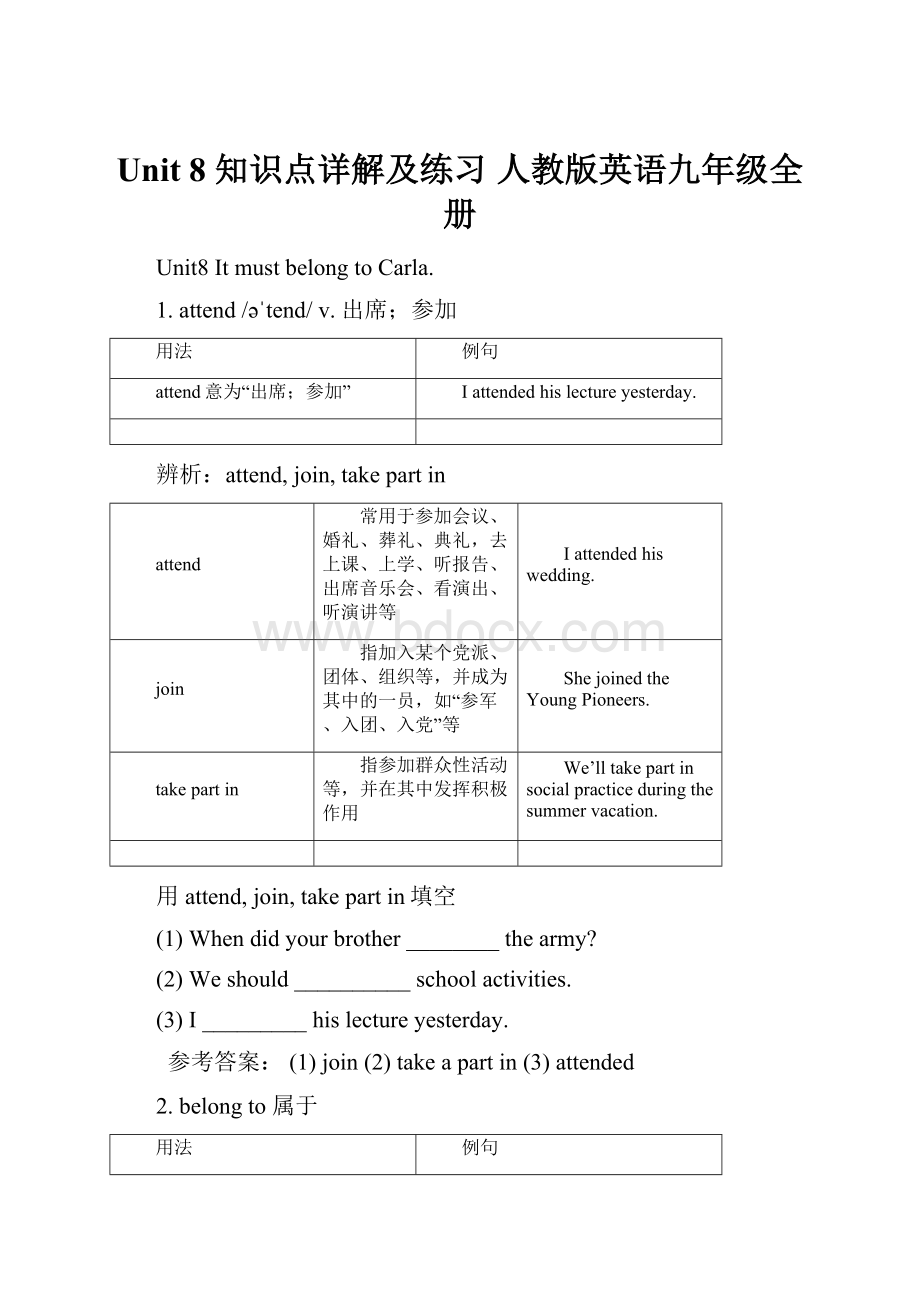Unit 8 知识点详解及练习 人教版英语九年级全册.docx
《Unit 8 知识点详解及练习 人教版英语九年级全册.docx》由会员分享,可在线阅读,更多相关《Unit 8 知识点详解及练习 人教版英语九年级全册.docx(15页珍藏版)》请在冰豆网上搜索。

Unit8知识点详解及练习人教版英语九年级全册
Unit8ItmustbelongtoCarla.
1.attend/əˈtend/v.出席;参加
用法
例句
attend意为“出席;参加”
Iattendedhislectureyesterday.
辨析:
attend,join,takepartin
attend
常用于参加会议、婚礼、葬礼、典礼,去上课、上学、听报告、出席音乐会、看演出、听演讲等
Iattendedhiswedding.
join
指加入某个党派、团体、组织等,并成为其中的一员,如“参军、入团、入党”等
ShejoinedtheYoungPioneers.
takepartin
指参加群众性活动等,并在其中发挥积极作用
We’lltakepartinsocialpracticeduringthesummervacation.
用attend,join,takepartin填空
(1)When did your brother ________the army?
(2)We should __________school activities.
(3)I_________his lectureyesterday.
参考答案:
(1)join
(2)take a part in(3)attended
2.belongto属于
用法
例句
belongto不能用于进行时态,也不能用于被动语态。
The islandsbelong to England.
belongto可与名词性物主代词或名词所有格进行句型转换。
Thiswatchbelongstome.=Thiswatchismine.
(1)Thebookmust.She’stheonlyonewho’sstudyingFrench.
A.belongtoLiYing’sB.beLiYing
C.belongLiYing’sD.belongtoLiYing
(2)Asisknowntousall,Chinaisadevelopingcountry______thethirdworld.
A.belongingB.belonged
C.belongingtoD.belongedto
参考答案:
(1)D
(2)C
3.valuable/ˈvæljuəbl/adj.有价值的;贵重的,宝贵的
用法
例句
valuable形容词意为“有价值的;贵重的,宝贵的”
Hiswifeputonvaluableringandnecklace.
value作为名词时意为“价值”;作为动词意为“重视;珍惜”
Hisworkhasnovalue.
Ivaluetheopinionofmyhusbandandweagreeonmostthings.
Peter’sfatheraskedhimtospendhistimeonsomething______researchingintoinsteadofplayingallthetime.
A.worthyB.valuableC.worthD.precious
参考答案:
C
4.noise/nɔɪz/v.噪音
用法
例句
noise名词意为“噪音”
Therewastoomuchnoiseintheroomandheneededpeace.
辨析:
noise;sound与voice
noise
意为“噪音、喧闹声”,常指不悦耳、不和谐的嘈杂声
Pleasedon’tmakemuchnoiseinclass.
sound
意为“声音”,泛指各种声音
Lighttravelsmuchfasterthansound.
voice
意为“嗓音”,一般指人的声音,如说话声、歌声、谈笑声等。
Theboyhasabeautifulvoice.
用noise;sound与voice填空
(1)Don’t speak in such a high __________.
(2)Will you please make less __________, boys and girls?
(3)We couldn’t hear a _________ here.
参考答案:
(1)voice
(2)noise(3)sound
5.sleepy/'sliːpɪ/adj.困倦的;瞌睡的
用法
例句
sleepy形容词意为“困倦的;瞌睡的”,可以作表语或者定语
Iwasbeginningtofeelamazinglysleepy.
辨析:
sleepy;asleep与sleep
sleepy
形容词
意为“困倦的;瞌睡的”可作表语或定语
feelsleepy“感到困倦”
Heissosleepythathecan’tlistencarefully.
他太困了,以至于他不能认真听讲。
asleep
形容词
意为“睡着的”只能作表语
fallasleep“睡着”
TheoldmanfellasleepwhilewatchingTV.
那位老人在看电视时睡着了。
sleep
动词
意为“睡觉”
sleepwell“睡得好”
Pleasebequiet!
Thebabyissleeping.
请安静!
那个婴儿在睡觉。
名词
意为“睡眠;睡觉”
gotosleep“入睡;睡着”
Weneedatleast8hours’sleepatnight.
我们晚上至少需要8小时的睡眠。
(1)—Whyareyoulooking_______inclassallday?
—BecauseIcan’tfinishmyhomeworkuntileleveneverynight.
A.awakeB.asleepC.sleepingD.sleepy
(2)选词填空:
sleepy;asleep与sleep
Ioften________for8hourseverynight.
Myfatherfell________whilehewasreadingabook.
Thelittleboycouldn’tgoonstudyingbecausehefelt________.
参考答案:
(1)D
(2)sleep;asleep;sleepy
6.information/ɪnfə'meɪʃ(ə)n/n.信息;消息
information意为“信息、消息”是不可数名词所以没有复数形式,只能够用alotof,much,little等词修饰。
Canyougivemeanyinformationonthismatter?
辨析:
information与message
information
信息;消息
不可数名词
指从学习、经验或指导中得到的信息
HewantedtogetnewinformationfromtheInternet.
message
消息;口信;音信
可数名词
一般指口头传递或书写的“消息;口信;音信”等
Wouldyoumindgivinghimamessage?
—HowcanIgetsome______aboutthe2016OlympicGames?
—WhynotsearchtheInternet?
A.informationB.experienceC.practiceD.message
参考答案:
A
7.receive/rɪ'siːv/v.收到;接收
receive动词意为“收到;接待”IreceivedyourletteronNovember7.
辨析:
receive与accept
receive
接待;收到
指客观的收到
Hereceivedaletterfromhisfriend.
他收到了朋友的来信。
accept
接受
指主观的接受
Sheacceptedmygift.
她接受了我的礼物。
选词填空:
receive与accept
I__________aninvitationtothepartyyesterday,butIrefusedto_________it.
参考答案:
received;accept
8.therestof其余的,剩余的
用法
例句
therestof“其余的,剩余的”谓语动词的单复数形式取决于of后接的名词的单复数。
Therestofbooksaremine.
Therestofwaterisclean.
单独做代词时,单复数取决于所代事物的单复数
Therearetenapples.Thefiveapplesaremine,andtherestareyours.
用was和were填空
(1)Therestoftheboys____watchingTV.
(2)Therestofthemoney____stolen.
参考答案:
(1)were
(2)was
9.arrivein到达
用法
例句
(1)arrivein+大地点
WhenwillyouarriveinShanghai?
(2)arriveat+小地点
Iwasthefirsttoarriveatthepartylastnight.
辨析:
arrive,get,reach
arrivein/at+地点=getto+地点=reach+地点
Hearrivedin/gotto/reachedShanghaijustnow.
注意:
若其后接的是地点副词,则用arrive,get,reach不加介词。
Hewastiredwhenhearrived/got/reachedhome.
Theyarrived____Beijing____acoldmorning.
A.in;inB.in;onC.at;onD.at;in
参考答案:
B
10.suit/su:
t/n.西服,套装v.适合
用法
例句
(1)n.西服,套装
Onformaloccasions,menshouldwearsuits.
(2)v.适合suitsb.适合某人
Doyouthinkthedresssuitsme?
(1)翻译:
绿色适合你。
________________________________________________________________
(2)翻译:
我想买一套带有银色领带的黑色西服。
________________________________________________________________
参考答案:
(1)Greensuitsyou.
(2)Iwanttobuyablacksuitwithasilvertie.
11.else/els/adj./adv.别的,其他的
用法
例句
(1)else用作形容词时常常用作后置定语,即:
放在疑问代词who,what,which等后面,或者放在something,anything,nothing,anyone,everyone等不定代词之后
1)Whoelsecanyousee?
2)--Whatelsedoyouwant?
--Nothingelse.
(1)Pleasedon'tgo.Ihave______totellyou.
A.othersomethingB.somethingother
C.elsesomethingD.somethingelse
(2)Icanseetigers,pandas,monkeysand______animalsinthezoo.
A.othersomeB.someother
C.elsesomeD.someelse.
参考答案:
DB
练习:
1.Thebadweathercan’tstophimtoschoolontime.
A.goB.togoC.togoingD.fromgoing
2.Itissilly_____thepianoinsuchlowprice.
A.ofhimtosellB.forhimtosellC.ofhimsellingD.forhimtoselling
3.Listening,speakingandreadingareallimportant_____writing.
A.butB.besidesC.exceptD.expect
4.Therearemanykindsofbikeshere.Shecan’tdecide_____.
A.wheretobuyB.whichtobuyC.howtobuyD.whentobuy
5.---Doyouknowthese_____overthere?
They'resohandsome.
---Yes,theyaremyfriends.
A.policemansB.CanadasC.postmansD.heroes
6.TheOlympics_____inChinain2008.
A.wastakenplaceB.tookplace
C.washappenedD.happened
7.---Didyou_____thepartylastnight?
---Yes,itwasagoodchance_____somenewfriends.
A.attend;makingB.join;making
C.attend;tomake
D.join;tomake
8.---Whoisrunningonthesportsfield?
---It_____beDavid,Heisillathome.
A.can'tB.mustn'tC.maynotD.shouldn't
9.---Thatmanwasoftenseen_____moneyfromshops.
---Oh,mygod!
Ineedtokeephim_____mystore.
A.steal;awayB.stole;fromC.tosteal,fromD.stealing;away
10.Couldyoutellme_____?
A.whattimeisit
B.thatiftheearthgoesaroundthesun
C.wherehelivesin
D.whetheritwillraintomorrow
11.Thebookmust_____.She’stheonlyonewho’sstudyingFrench.
A.belongtoLiYing’sB.beLiYing
C.belongLiYing’sD.belongtoLiYing
12.---Let'sgotoYanduParkifit_______tomorrow.
---Butnobodyknowsifit_______tomorrow.
A.won'train;rainsB.doesn'train;rains
C.doesn'train;willrainD.won'train;willrain
13.Icouldn’tseeadogor_____,either.
A.anythingelseB.elseanything
C.otheranythingD.anythingother
14.Anothertwomonthswillbeneededbeforethenewbridge________.
A.completesB.iscompleted
C.hascompletedD.willbecompleted
15.Itis_____amazingnewsthateverybodywasshocked.
A.suchanB.suchaC.soD.such
16.Thetwinswho_____bornin2008_____suddenly.Howsadtheirparentsare!
A.were,aremissingB.was,aremissed
C.are,arelostD.were,arelosing
17.Thebabyisalwayscrying.He_____behungry.
A.can’t B.must C.should D.would
18.Thetrainwaslate,_____wehadtowaitforhalfanhour.
A.becauseB.orC.soD.but
19.Today,theforestshavealmostgone.Peoplemust_____downtoomanytrees.
A.stoptocutB.stopfromcutting
C.bestoppedtocutD.bestoppedfromcutting
20.—Whathappened________Jackyesterday?
—Helosthiscar.
A.forB.toC.withD.at
参考答案:
DABBDBCACDDCABDABCDB
二.语法精讲
情态动词表推测
情态动词可以表示说话的语气,本单元我们主要学了must,might,couldcan等情态动词表示推测的用法。
1.情态动词表推测时,不同的形式表示不同的时态。
结构形式
用法
例句
情态动词+do
表示对现在情况的推测
Shemightbeintheclassroomnow.她现在可能在教室里。
情态动词+bedoing
表示对正在发生的事情的推测
It’steno’clock.Hemustbehavingclass.十点钟了,他一定在上课。
情态动词+havedone
表示对过去或已完成的事情的推测
Sheiscrying.Shemusthaveknownthebadnews.她在哭,她一定已经知道了这个坏消息。
2.情态动词表推测的意义和用法
句式
情态动词
用法
意义
例句
肯定句
must
表示有把握的肯定推测
一定;肯定
Hemustbeverytiredafteralongjourney.长途旅行后,他一定很累。
could/may/might
其肯定程度逐渐减弱,表示把握性不大的推测
可能
Itmightrainthisafternoon.今天下午可能会下雨。
否定句
can’t
表示有把握的否定推测
不可能
Shecan’tbeatschool.It’sSundaytoday.她不可能在学校里。
今天是星期天。
疑问句
can/could
表示推测
可能
CouldMikebeanIndianboy?
迈克可能是一个印度男孩吗?
注:
1)could用于否定句时,语气较can’t缓和,意为“不可能”。
Hesaidthenewscouldn’tbetrue.他说那个消息不可能是真的。
2)may/might用于否定句时,表示不太有把握的否定推测,意为“可能不”。
Thiswordmightnotmean“表扬”.这个单词可能不是“表扬”的意思。
3)must用于否定句时,不表推测;mustn’t的意思是“禁止;一定不要”。
Youmustn’tplaysoccerinthesquare.你们一定不能在广场上踢足球。
练习:
1.You_____(can/must)betiredafterworkingforalongtimewithoutarest.
2.—Whoisthewomanoverthere?
IssheMrs.Smith?
—It_____(mustn’t/can't)beher.Sheismuchtaller.
3.—Where'sZhangLei?
—I'mnotsure.He_____(could/need)bei